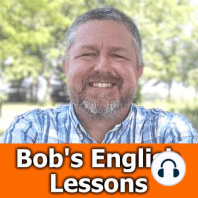4 min listen

Learn the English Phrases LONG STORY SHORT and A LIKELY STORY
Learn the English Phrases LONG STORY SHORT and A LIKELY STORY
ratings:
Length:
4 minutes
Released:
Aug 30, 2020
Format:
Podcast episode
Description
Read along to practice your English and to learn the English phrase LONG STORY SHORT and A LIKELY STORY:So in this English lesson I wanted to help you learn the English phrase, long story short. This is a phrase we use when we're telling a story and when it's taking us way too long to tell the story. Sometimes when I'm telling Jen about something happened at work, sometimes she starts to look a little bit bored. And so instead of telling the whole story about what happened at work, I will just say, "Well, long story short, the boss is really happy with the job that I did." So if you're ever telling a story in English and the person looks like they're starting to not listen to you, if they look like they're starting to get a little bit bored, you can just say, "Long story short, my boss is really happy with me." Or long story short, the man stole the chocolate bar. You can also say to make a long story short. So there it is a longer phrase, but I often just say, long story short, the boss is really happy with me.The second English phrase that I wanted to teach you is the phrase a likely story. If you say to someone that's a likely story, or if you say likely story, it means you don't believe the story that they are telling you. Sometimes my kids will tell me about something that happened at school and Jen and I will say to each other, "Well, that's a likely story." Which means that we don't really believe the story that they've told us. They're not exactly lying, but we're not sure it's the whole truth. So a likely story is a story that someone has told you that you don't really believe.So once again, when you say long story short, it's something you say when you're telling a story and you wanna get to the end quicker. You say, "Well, long story short." And then you give the ending. And then a likely story is a story that you don't necessarily believe, necessarily believe.Hey, before I go to the next part of the video, I wanted to show you the clouds today. So let me just kind of pan the camera up for a sec. The clouds for some reason are in a beautiful pattern up there in the sky.So I thought you might want to see that. And now let's move on and look at a comment from one of the previous videos. This comment is from Ali Alfayed. And Ali says, "Hello Mr. Bob. Do you mind letting me know what the difference is between fill in and fill out? I am still perplexed between these two phrasal verbs. Thank you in advance." And then my answer is you can fill in a hole in the ground with dirt, you can fill out a form, you can also fill in a form. I hope that helps. But I'm not sure that does help. Does it, Ali? I mean, in some ways phrasal verbs can be more confusing the more you try to understand them. So let me just explain again, if you dig a hole in the ground and you want to put the dirt back in the hole, we would say you would fill in the hole. But fill out and fill in, when it comes to forms, like if I go to renew my license, I need to fill in a form. I can also say that I need to fill out a form. Now, it probably has a whole lot more, a whole lot of more meanings than that. Boy, I'm really having trouble speaking English myself today but definitely fill in, has to do with physically filling in a hole and then fill in and fill out is something you can use when you are looking at a forum.(Transcript shortened due to Podcast description length restrictions.)WANT MORE ENGLISH LESSONS? GO TO YOUTUBE AND SEARCH, "BOB THE CANADIAN"Support the show (https://www.patreon.com/bobthecanadian)
Released:
Aug 30, 2020
Format:
Podcast episode
Titles in the series (100)
Learn the English Sayings TOO MANY COOKS SPOIL THE BROTH and MANY HANDS MAKE LIGHT WORK by Bob's Short English Lessons